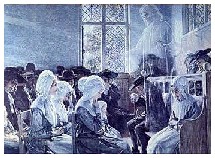


 |
 |
 |
This web page uses note and page numbering from The New Oxford Annotated Bible, New Revised Standard Version with the Apocrypha, Third Edition. Other editions of the NRSV will contain the same notes, but their lettering and page numbers will differ from what's on this page. For more information about interpreting the text and translation notes found in the lower right corner of each page of NRSV biblical text, consult the section "To the Reader" in your NRSV, or click here.
Please Email me
with any questions, comments or corrections on this page.
Opportunities for typos are many!
Note "e" on p. 43 NT, on verse 23:4
"Other ancient authorities lack hard to bear"
This is a TEXTUAL issue; the ancient manuscripts differ as to the exact wording of the Greek. Some ancient manuscripts say "They tie up heavy burdens, hard to bear..." while others say just "They tie up heavy burdens..." The NRSV translators have chosen the former reading, but the note is there to let us know that there is a textual issue going on behind the scenes. Comparing English translations, the KJV, RSV, and NRSV all include "hard to bear" (the KJV translates it "grievous to be borne"); the NIV leaves it off.
With a little knowledge of Greek and some reference books, one can get more information about exactly what the textual issue is for a particular verse:
(1) An interlinear Greek-English Bible will show the Greek words with a quick "gloss" of the English below each one, and an English translation such as the NRSV in a column on the side. Here's an example with this part of Matthew 23:4 highlighted, from The New Greek Interlinear New Testament (Tyndale House Publishers, Wheaton IL, 1990).
(2) Scholars use a "critical edition" of the Greek New Testament, which gives scholarly consensus as to the best reading of the Greek "above the line" and a "textual apparatus" of notes to tell exactly which ancient manuscripts contain which variants for each verse. This example is from The Greek New Testament, Fourth Revised Edition (Deutsche Bibelgesellschaft/United Bible Societies, 2001).
(3) Finally, one of the scholars who helped decide which readings belong "above the line" produced a book called A Textual Commentary on the Greek New Testament (by Bruce M. Metzger, United Bible Societies, 1971). The section that explains the decision on Matthew 23:4 is posted here as an example. Notice that Professor Metzger first gives the opinion and reasoning of "a majority of the Committee," to keep the phrase meaning "hard to bear" but to put it in brackets indicating it's questionable; then at the top of the next page he gives his own opinion (signed "B.M.M."), that these words should have been omitted altogether. What a gentleman!
The scholars who produce the standard critical edition of the Greek New Testament also rank their judgments as to the correct reading from A (very sure) to D (not sure at all). They rank this reading, with "hard to bear" included but in square brackets, as a C.
Note "a" on p. 44 NT, on verse 23:8
"Gk brothers"
This is a TRANSLATIONAL issue; the ancient manuscripts are in agreement on what the Greek word is (adelphoi), which is the masculine plural form of "brother" or "sibling." The NRSV has chosen to translate it as "students," presumably for reasons of gender inclusiveness and because of the context of the rest of the verse. In English nowadays "brothers" generally means all males and only males, whereas the Greek adelphoi refers to a group in which there are at least some males, but there might also be females. So to use "brothers" in English is misleading in that it sounds like there are only males. In this case, the KJV, RSV and NIV all read "brothers" and the NRSV is the only one to go with "students." A person could write a whole book on the NT meanings of adelphoi: brothers, fellow believers, students of Christ, comrades in the faith.
Note "b" on p. 44 NT, on verse 23:10
"Or the Christ"
This is a TRANSLATIONAL issue; any time the note starts with "Or" it's telling you that there's more than one possibility for translating that particular word of the original language. This very common Greek word Christos "means" messiah, anointed one, Christ, all wrapped up in one. Its origins lie deep within the Old Testament/Hebrew Bible, and scholars trying to decide how to translate it into English in any given verse have a delicate task. The fact that there's a note here means that the NRSV translators want to alert the reader to the potential difference in nuance in this particular verse.
Note "c" on p. 44 NT, on verse 23:13
"Other authorities add here (or after verse 12) verse 14, Woe to you, scribes and Pharisees, hypocrites! For you devour widows' houses and for the sake of appearance you make long prayers; therefore you will receive the greater condemnation."
This is a TEXTUAL issue. The "other authorities" are other ancient manuscripts with different wording of the Greek text. You can read the scholars' opinions about this variant at the bottom of the same page from the Textual Commentary that we looked at above. Check the KJV and NIV to see how they handle this verse.
Note "d" on p. 44 NT, on verse 23:15
"Gk Gehenna"
This is a TRANSLATIONAL issue. The actual Greek word is Gehenna, but the NRSV translators have interpreted this as "hell," presumably because most readers wouldn't know what it would mean if they read "twice as much a child of Gehenna." They might even think Gehenna was a person rather than a place or state of being!